 Approvals & Certifications
Approvals & Certifications
Product certification is an essential process that helps ensure products, solutions, and services comply with
safety regulations and quality criteria based on international standards. Businesses must routinely verify their
products are fit for use and such certification is usually performed by third-party accreditation organizations.
TUV:TÜVs (German pronunciation: short for German: Technischer Überwachungsverein, English:
Technical Inspection Association) are internationally active, independent service companies from Germany and
Austria that test, inspect and certify technical systems, facilities and objects of all kinds in order to minimize
hazards and prevent damages. The TÜV companies are organized in the three large holdings TÜV Nord, TÜV
Rheinland and TÜV SÜD (with TÜV Hessen) as well as the smaller independent TÜV Thüringen, TÜV Saarland and
TÜV Austria.
Highly recognized worldwide as a trademark of trust and quality, a TÜV certification ensures that a product,
service, or process has been tested for safety and that it complies with the requirements of national, regional,
and international regulations. It assures consumers that the product has been checked thoroughly for any
defects or potentially dangerous materials.
BV: Bureau Veritas is a French company specialized in the testing, inspection and certification founded in 1828.
It operates in a variety of sectors, including Marine & Offshore, Building & Infrastructure, Agri-food &
Commodities, Industry, Certification and Consumer Products.
SAA: SAA Approvals is accredited by the Joint Accreditation Service of Australia and New Zealand (JAS-ANZ), as a
third-party certification body. SAA Approvals is also gazetted by the NSW Office of Fair Trading Department of
Commerce as a Recognised External Approvals Scheme. SAA is also accredited by the Queensland Government
to issue certificates under the RECS scheme which are uploaded to the EESS/RCM database. This allows SAA to
issue certificates for regulated electrical equipment that has been proven to comply with the safety
requirements of the applicable Australian / New Zealand standard, and is recognised everywhere in Australia
and New Zealand.
UL: UL, LLC is a global safety certification company headquartered in Northbrook, Illinois. It maintains offices in
46 countries. Established in 1894 as the Underwriters' Electrical Bureau (a bureau of the National Board of Fire
Underwriters), it was known throughout the 20th century as Underwriters Laboratories and participated in the
safety analysis of many of that century's new technologies.
UL is one of several companies approved to perform safety testing by the U.S. federal agency, the Occupational
Safety and Health Administration (OSHA). OSHA maintains a list of approved testing laboratories, which are
known as Nationally Recognized Testing Laboratories.
VDE: Ever since the first electro-technical standard VDE 0100 was passed on November 23, 1895 at the
Wartburg Castle in Eisenach, Germany, VDE standards have been an inseparable part of the development of key
technologies in electrical engineering, information technology and consumer protection.
DKE - the German Commission for Electrical, Electronic & Information Technologies - is a joint organization of DIN
(German Institute for Standardization) and the VDE. The VDE is responsible for the daily operations of the DKE,
which is the national organization for developing standards and safety regulations for electrical, electronic and
information technologies. DKE represents German interests in the European and international standardization
organizations CENELEC and IEC.
The VDE Testing and Certification Institute tests electrical products and issues the worldwide known and
respected VDE certification mark. In turn, the know-how accumulated annually in the roughly 16,000 tests flows
back into the VDE's standardization work. The VDE publishing house (VDE Verlag GmbH) publishes and markets
the VDE regulatory works and specialist publications on standardization.
Product Certificates
| ISO 9001 | ||
 |
||
| CE-IEC 60502-1 | BV | SAA161181 |
 |
 |
 |
| CB Certificate - IEC60227 | CB Certificate - IEC60502-1 | CB Certificate - IEC60502-2 |
 |
 |
 |
| SAA-182257-EA | SAA182258 | SAA182259 |
.jpg) |
.jpg) |
.jpg) |
| SAA-173128-EA | VDE-H05V2V2H2-F | TUV MARK- Fire Resistant Cables FFX200 |
.jpg) |
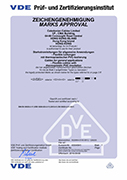 |
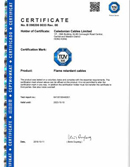 |
| TUV MARK-BS 5467 | TUV MARK-BS 6231 | TUV MARK-BS 6724 |
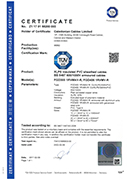 |
.jpg) |
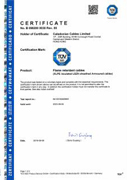 |
| TUV MARK-BS 7211 | TUV MARK-BS 7889 | TUV MARK-BS 8573 |
.jpg) |
.jpg) |
.jpg) |
| TUV MARK-EN 50288-7 | CE-EN 50288-7 | TUV MARK- EN 50525-2-11 H05VV-F |
.jpg) |
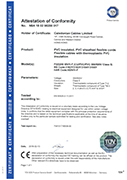 |
.jpg) |
| CE-EN 50525-2-11 H05VV-F | TUV MARK-EN 50525-2-11 H05V2V2-F |
CE-EN 50525-2-11 H05V2V2-F |
.jpg) |
.jpg) |
.jpg) |
| TUV MARK-EN 50525-2-31 | CE-EN 50525-2-31 | TUV MARK-EN 50525-3-41 |
.jpg) |
.jpg) |
.jpg) |
| CE-EN 50525-3-41 | TUV MARK-EN 50618 | TUV MARK-IEC 60502-1 |
.jpg) |
.jpg) |
.jpg) |
| BS 7846 TUV CERT | BS 6004 TUV CERT | TUV MARK-IEC 60502-1 XLPE-LSZH-Screen |
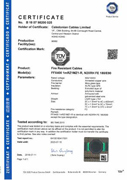 |
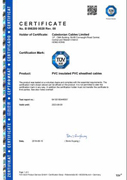 |
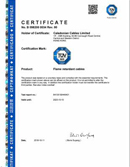 |
| TUV MARK-IEC 60502-1 XLPE-LSZH | TUV MARK-IEC 60502-1 PVC-PVC | TUV MARK-IEC 60502-1 PVC-PVC-screen |
 |
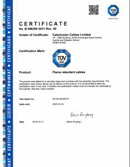 |
 |
| TUV MARK - BS8592 FFX100 | TUV MARK - Fire Resistant Cables FFX100 | TUV MARK - Fire Resistant Cables FFX400 |
 |
 |
 |
| TUV MARK EN 50264-3-1 | UL 83 | N4169 Power & Control Cable |
 |
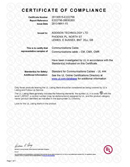 |
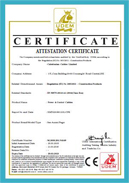 |
| N4168 Instrumention & Control Cable | N4167 Data Cable | N4166 Coaxial Cable |
 |
 |
 |
| Fire resistant instrumentation and control cables IS+OS | ETL CAT6A U-FTP LSZH | ETL CAT5e UTP LSZH |
 |
 |
 |
| ETL CAT6 FTP LSZH | ETL CAT6 UTP LSZH | ETL CAT5E FTP LSZH |
 |
 |
 |
| UL 44 | ETL CAT7 S-FTP LSZH | TUV MARK - Fire Resistant Cable - NHXH FE180 E90 |
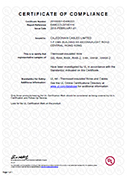 |
 |
 |
| EN 50264-3-2 300/500V(FRL-MW-05M-OS) | EN 50306-2 TUV | BS 7629 TUV |
 |
 |
 |
| TÜV Rheinland - IEC60227-3 | TÜV Rheinland - IEC60502-1 | UL 2806 |
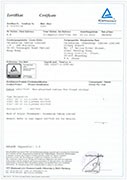 |
 |
 |







